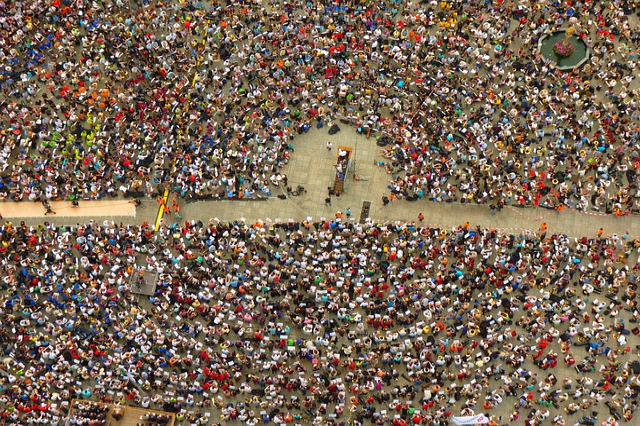Bangladesh — The Bangladeshi student group leading demonstrations that have spiralled into deadly violence suspended protests Monday for 48 hours, with its leader saying they had not wanted reform “at the expense of so much blood”.
What began as demonstrations against politicised admission quotas for sought-after government jobs snowballed into some of the worst unrest of Prime Minister Sheikh Hasina’s tenure.
A curfew has been imposed and soldiers are patrolling cities across the South Asian country, while a nationwide internet blackout since Thursday has drastically restricted the flow of information to the outside world.
“We are suspending the shutdown protests for 48 hours,” Nahid Islam, the top leader of the main protest organiser Students Against Discrimination, told AFP from his hospital bed.
He was being treated for his injuries after being beaten by people he accused of being undercover police, he said.
The world needs to see How Sheikh Hasina killing the innocent students during the protest #StudentsUnderAttack #StudentsUnderAttackInBangladesh #StepDownHasina #BangladeshiStudentsareinDanger #Bangladesh pic.twitter.com/A0NfzNQs9p
— Fire Starter (@X420000) July 21, 2024
“We demand that during this period the government withdraws the curfew, restores the internet and stops targeting the student protesters.”
On Sunday, the Supreme Court pared back the number of reserved jobs for specific groups, including the descendants of “freedom fighters” from Bangladesh’s 1971 liberation war against Pakistan.
“We started this movement for reforming the quota,” Islam said.
“But we did not want quota reform at the expense of so much blood, so much killing, so much damage to life and property.”
At least 163 people have died in clashes, including several police officers, according to an AFP count of victims reported by police and hospitals.
Sporadic violence continued Monday, with four people brought to the Dhaka Medical College Hospital with bullet injuries, an AFP reporter at the scene saw.
Government officials have repeatedly blamed the protesters and opposition for the unrest.
Dhaka Metropolitan Police spokesman Faruk Hossain told AFP that “at least 532” people had been arrested in the capital since protests began, including some leaders of the opposition Bangladesh National Party.
Ali Riaz, a professor of politics and leading Bangladesh expert at Illinois State University, described the violence as “the worst massacre by any regime since independence”.
“The atrocities committed in the past days show that the regime is entirely dependent on brute force and has no regard for the lives of the people,” he told AFP.
“These indiscriminate killings cannot be washed by a court ruling or a government announcement.”
Over 100 Dead in Bangladesh Student Protests Over Government Job Quotas
More than 100 people have died during student protests in Bangladesh, as demonstrators demand the abolition of quotas for government jobs. With the country facing a high youth unemployment rate, students are… pic.twitter.com/aWXHNIhDYF
— OSINT Aggregator (@AggregateOsint) July 20, 2024
Diplomatic question
Bangladeshi Nobel Peace Prize laureate Muhammad Yunus urged “world leaders and the United Nations to do everything within their powers to end the violence”.
“There must be investigations into the killings that have taken place already,” the 83-year-old said in a statement, his first public comments since the unrest began.
The respected economist is credited with lifting millions out of poverty with his pioneering microfinance bank but earned the enmity of Hasina, who has accused him of “sucking blood” from the poor.
“Bangladesh has been engulfed in a crisis that only seems to get worse with each passing day,” Yunus said. “High school students have been among the victims.”
Diplomats in Dhaka questioned Bangladeshi authorities’ deadly response to the protests.
Foreign Minister Hasan Mahmud summoned ambassadors for a briefing on Sunday and showed them a 15-minute video that sources said focused on damage caused by protesters.
US ambassador Peter Haas told Mahmud he was presenting a one-sided version of events, according to a senior diplomatic official.
Bangladesh Prime Minister runs away from the country after protesters protest day and night. pic.twitter.com/GDZVVNXJzT
— Captain Dominic Omondi (@CaptainDominicO) July 22, 2024
“I am surprised you did not show the footage of police firing at unarmed protesters,” the source quoted Haas as telling the minister.
A US embassy official speaking on condition of anonymity confirmed the ambassador’s comments.
The diplomatic source added that Mahmud did not respond to a question from a UN representative about the alleged use of UN-marked armoured personnel carriers and helicopters to suppress the protests.
Bangladesh is a major contributor to UN peacekeeping operations around the world — earning significant revenues from its efforts — and has UN-marked equipment in its military inventories.
‘Freedom fighter’ quota
With around 18 million young people in Bangladesh out of work, according to government figures, the quota scheme’s reintroduction deeply upset graduates facing an acute jobs crisis.
The Supreme Court decision curtailed the number of reserved jobs from 56 percent of all positions to seven percent, most of which will still be set aside for the children and grandchildren of “freedom fighters” from the 1971 war.
While 93 percent of jobs will be awarded on merit, the decision fell short of protesters’ demands to scrap the “freedom fighter” category altogether.
Critics say the quota is used to stack public jobs with loyalists to Hasina’s ruling Awami League.
Opponents accuse her government of bending the judiciary to its will.
Hasina, 76, has ruled the country since 2009 and won her fourth consecutive election in January after a vote without genuine opposition.
Her government is also accused by rights groups of misusing state institutions to entrench its hold on power and stamp out dissent, including by the extrajudicial killing of opposition activists.
Follow African Insider on Facebook, Twitter and Instagram
Source: AFP
Picture: Pixabay
For more African news, visit Africaninsider.com


